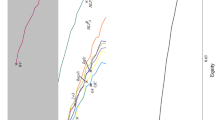Abstract
During the Dutch parliamentary elections of 2002, the new party ‘List of Pim Fortuyn’ (LPF) has won 26 seats mainly at the cost of the governing parties: next to D66, the PvdA and the VVD, which both hoped to win the elections. After the election, these parties had become smaller than CDA and LPF. Why could one ‘newcomer’ without a well-developed party organization gain such a smashing electoral victory? We argue that who wants to understand Fortuyn's victory should study his victims, i.e. the ‘established’ main parties on the left and right of the Dutch party system. We argue that the programmatic convergence of the established parties has made them look more similar and therefore almost indistinguishable in the eyes of many voters. This has reinforced the feeling of many voters that the established parties form merely a ‘cartel’ without having a sense for the problems of ordinary citizens, let alone the capacity to solve them. In addition, the ongoing rise of electoral volatility in the Netherlands shaped the room for ‘catching’ this segment of the Dutch electorate. Fortuyn effectively used this discontent by means of right-wing populism. Although he was often pictured as a right-wing extremist, this is not a convincing argument when his party programme is compared with other European parties that are considered either as ‘conservative’ or as part of the emerging ‘new right’ party family. The dramatic decline in votes of the LPF in the elections of January 2003 does not mean that the impact of this party has vanished. Rather the programmatic positions of the main parties were affected by the rise of the LPF. Most parties have moved further to the right of the party system in 2003 in order to become more attractive to voters who voted for the LPF in 2002.
Similar content being viewed by others
Author information
Authors and Affiliations
Rights and permissions
About this article
Cite this article
Pennings, P., Keman, H. The Dutch Parliamentary Elections in 2002 and 2003: The Rise and Decline of the Fortuyn Movement. Acta Polit 38, 51–68 (2003). https://doi.org/10.1057/palgrave.ap.5500001
Published:
Issue Date:
DOI: https://doi.org/10.1057/palgrave.ap.5500001




